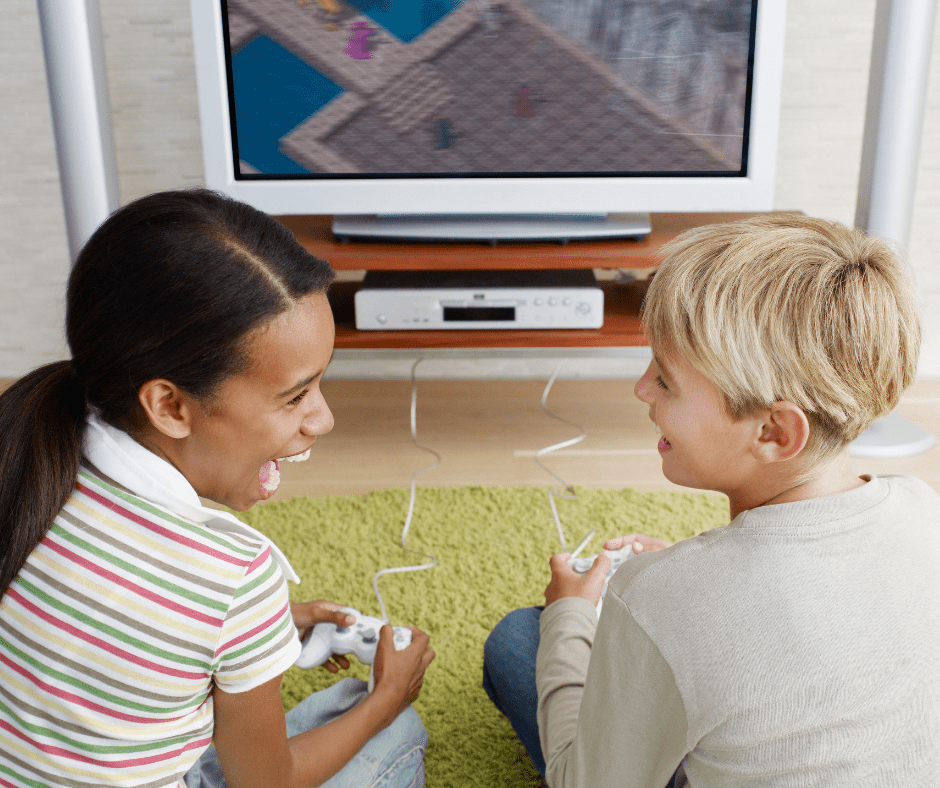
8 Ways Video Games Can Actually Help Your Kids’ Development
Studies show that school-aged kids are spending more than 6 hours a day in front of a screen. Between schoolwork, recreational time, and mobile devices, our kids are in front of a screen more and more every day. But how damaging is that, exactly? Well, the risk of gaming disorders is indeed a concern, especially for kids who play excessively or obsess over games and withdraw from other activities. Luckily there are many useful tips online on how to deal with gaming disorders, and how you can spot them. But don’t resort to just removing the game altogether. For one thing, it’s ineffective: Kids now have access to mobile devices, and play at school. Just with anything, moderation and variety make for a healthy (media) diet. Today’s guest post shares 8 ways video games can actually help your kids’ development. Read on!
This is a guest post by Kyle Ford.

As it turns out, video games may actually be healthy for a kid’s cognitive, emotional, and even social development! Here’s 8 ways video games can actually help your kids’ development.
8 Ways Video Games Can Actually Help Your Kid’s Development
1. Increases Concentration
With the rise of ADD and ADHD in kids, disrupted concentration has been blamed on our dependence on technology, and constant need to be entertained. But recent research actually points to specific video games as a way to improve concentration, especially in ADHD kids. Watch your child the next time they’re playing. The game is designed to be engaging on multiple levels, causing a hyper-focus state that becomes familiar to your child’s overactive brain, and could make other tasks, like studying and chores, easier, once they’re away from the game!
2. Helps Retain Information
Plenty of schools are using educational apps and programs to teach kids. From using online language courses like Duolingo in the classroom, to Khan Academy for students, or even flashcard apps at home, there are plenty of educational tools that double as video games, working with brain science to improve memory and retention. And because they’re games, they’re perfect for even the most reluctant students!
3. Teaches Kids To Handle Pressure
You might think your child is a bit of a wallflower and using video games to hide from the world. But studies show that video games actually help improve a kid’s ability to problem-solve and work under pressure. It’s no wonder! Action adventure gamesdon’t seem particularly educational to you, but they’re designed to keep brains and hands busy and to work together. To progress in a game setting, you have to be able to move and react quickly, making tough calls as you go. So the challenges they encounter while playing could teach them to cope with pressure in their own way.
4. Helps With Depression and Anxiety
Speaking of pressure. We’re long past the days when ‘healthy’ meant going outside to run around all day. If your kids aren’t withdrawn or distracted from everyday life, or from their usual hobbies, a few extra minutes on the game here, and there can often help treat depression and anxiety. Slower-paced, casual repetitive games can help distract from whatever they’re feeling, and the more tense, action-adventure games help blow off steam or work through aggression. Therapists have even begun working with game developers to create games specifically to help young people work through their depression and anxiety, with positive thinking games, games to help you learn meditation skills, and points for logging your thoughts in a mood journal.
5. Helps Improve Social Skills
It might not seem like it, but letting a child spend a few minutes every day on a social game, or playing online with friends can actually improve his social skills. Keeping a screen between himself and social interaction is an excellent way for an otherwise shy or awkward kid to connect with peers. And it helps to connect in the real world when you have something to talk about. Video games are always a huge part of pop culture. Giving kids a way to communicate with each other, is a great way to boost social skills.

6. Can Encourage Physical Activity
The sheer number of sport-based games should make this one pretty clear. The debate whether kids who play electronic sports don’t play real sports is still continuing. In fact, some studies show that kids who regularly play sports games see moves they like in the game, and practice how to get the effect in real life, whether it be skateboarding, basketball, or hockey. While others link obesity to playing video games, even if they are sports themed.
It is probably related to the way parents stimulate their kids to take the sports games into the real world, and other external factors. Furthermore, the type of game is a factor as well. With the increase of motion-based games like Wii Fit and Wii Sports, just because your kid loves the video game, doesn’t mean they need to stay still! In fact, motion-based games could be a great way for a less-than-athletic child to build confidence and want to join in the games going on outside.
7. Encourages Competition, Cooperation, and Fairness
On the subject of sociability and real-life connection, video games with friends can help instill a sense of cooperation and fairness in your child. It’s a great bonding exercise for parents, too, and gives you an opportunity to be let inside the world of your child. Your kids always want to teach you for a change! Video games as a social activity also help introduce healthy competition in a child’s life, teaching valuable lessons about fair play and winning and losing with grace. Keep a watchful eye on your child’s conversations at all times though, to prevent any risks of bullying or predators.
8. Helps With “Leveling Up”
Goal setting and reaching a set goal are skills we all want for our kids. Video games can be great teaching tools. The constant leveling up and acquiring new skills lets your kid feel continually challenged and stimulated. Studiesindicate that video game instills a sense of persistence in children more than time spent in the classroom. This persistence in the face of a challenge has been demonstrated to carry over into other aspects of life later on.
Between online apps, social media games, and the usual console lineup constantly expanding, kids have more video games to choose from than ever before. And they tend to spend more time in front of the screen than previous generations. Should we be worried? Yes and no. Video games, like everything else in your child’s life, should be used in moderation.
But surprisingly, regular gaming actually helps develop skills and habits that can create positive change to last your child’s entire life. So let them spend the extra time in front of the screen. Your whole family will reap the benefits. Just make sure you’re not a sore loser, your children will probably win.
Guest Post by Kyle Ford

Kyle is a tenacious tech geek and founder of the popular HDDMag, an outlet for his shopping addiction. When he’s not downing giant mugs of butter coffee scribbling away on his laptop, he fancies himself a foodie, trying out every type of kim-chi there is. And an occasional marathon runner.
You May Also Like

Create Interactive Images with Kids to Explore the World from Home
May 25, 2020
How to Overcome the Struggles of Teaching Kids Math
December 13, 2017




One Comment
Pingback: